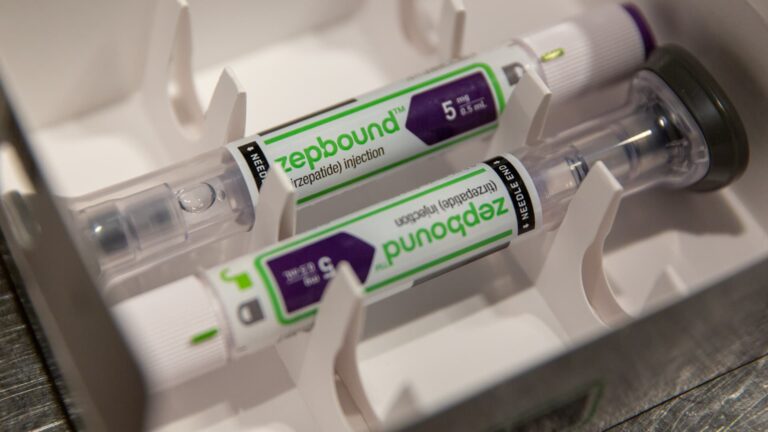Eli Lilly”Sales of blockbuster U.S. weight-loss drug Zepbound and diabetes treatment Munjaro declined in the third quarter, even though supply has largely recovered from widespread shortages in the U.S. It was less than expected.
According to the company, the reason for the slump in sales is not a supply and demand issue.
Eli Lilly instead blamed drug wholesalers for cutting inventories of Zepbound and Munjaro during Wednesday’s earnings call. Wholesalers buy drugs from manufacturers and sell them to hospitals, clinics, pharmacies, and other health care providers.
Pharmaceutical giant Eli Lilly said increased supply enabled Eli Lilly to meet backorders to wholesalers in the second quarter, which led to increased inventories of Zepbound and Mounjaro during the period. .
However, those wholesalers leveraged some of their existing inventory instead of purchasing more from the company in the third quarter, resulting in lower revenue from both treatments, Eli Lilly said.
According to estimates compiled by Street Account, Munjaro’s third-quarter sales were $3.11 billion, well below analysts’ expectations of $3.7 billion. Zepbound’s revenue for the quarter was $1.26 billion, lower than analysts’ expectations of $1.76 billion.
“The main culprit was the hit to Munjaro and Zepbound inventories…not a drop in demand,” Citi analyst Jeff Meacham said in a research note on Wednesday.
Jared Holtz, a health care equity strategist at Mizuho, said in an email that “destocking,” or selling existing inventory of drugs rather than adding to their inventory, is especially important given the high demand for therapeutic drugs. wrote that he was surprised.
But he noted that Eli Lilly is investing $10 billion to $15 billion to expand injectable manufacturing capacity this year alone, which could “reverse some of the trends reported over this period.” It will be helpful.”
Still, some analysts question whether inventory issues can fully explain what happened to Zepbound and Mounjaro’s sales in the third quarter. Barclays analyst Carter Gould wrote in a note Wednesday that this factor likely explains “a small portion” of the decline in pharmaceutical revenue, about 20%.
For the past two years, demand for weight loss and diabetes injections has outstripped supply.
But Eli Lilly’s supply problems began to ease earlier this year, with the Food and Drug Administration removing tirzepatide, the active ingredient in Munjaro and Zepbound, from its shortage list.
Earlier this month, a trade group representing compounding pharmacies that manufacture customized and inexpensive substitutes for brand-name drugs in short supply sued the FDA. The group said tirzepatide remains in short supply and should remain on the shortage list, which prompted authorities to reconsider the decision.
Eli Lilly executives insisted on an earnings call that underlying demand for the drug remains strong.
“Is there a problem with demand? No,” Eli Lilly CEO Dave Ricks said, pointing instead to “huge disruption in channel inventory.”
“What we don’t really have control over, and we don’t want to control, is the reality that Lilly’s downstream customers, wholesalers and retailers, want to stock which of 12 different dosage forms. I think they’re making their own decisions about what level.” Ricks said.
He noted that wholesalers are dealing with several constraints, including financial pressures. They also need to address “cold chain” capacity constraints and maintain temperature-controlled supply chains that ensure drug quality from manufacturing to delivery.
Ricks said Eli Lilly has not yet begun what it calls “demand generation activities” for Zepbound, such as advertising and promotions. The drug company plans to begin these efforts in November, he said.
This includes providing drug samples to healthcare providers.
Eli Lilly is also making significant investments in a direct-to-consumer website that offers telemedicine prescriptions and direct home delivery of certain medications to expand patient access, executives said on a conference call. .
Ricks dismissed the idea that the quarter’s disappointing sales were due to competition from a combined version of Mounjaro and Zepbound.
“We don’t really see a financial impact on Lilly from compounding,” Ricks said.

